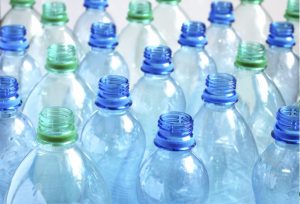
The use of enzymes to break down lignin in the quest to produce biofuels has a long history lined with small breakthroughs and a lot of futility. But a new study in Nature describes a mutant enzyme that can reduce plastic bottles to chemical building blocks to make new bottles:
A mutant bacterial enzyme that breaks down plastic bottles for recycling in hours has been created by scientists.
The enzyme, originally discovered in a compost heap of leaves, reduced the bottles to chemical building blocks that were then used to make high-quality new bottles. Existing recycling technologies usually produce plastic only good enough for clothing and carpets.
The company behind the breakthrough, Carbios, said it was aiming for industrial-scale recycling within five years. It has partnered with major companies including Pepsi and L’Oréal to accelerate development. Independent experts called the new enzyme a major advance.
Billions of tonnes of plastic waste have polluted the planet, from the Arctic to the deepest ocean trench, and pose a particular risk to sea life. Campaigners say reducing the use of plastic is key, but the company said the strong, lightweight material was very useful and that true recycling was part of the solution.
The new enzyme was revealed in research published on Wednesday in the journal Nature. The work began with the screening of 100,000 micro-organisms for promising candidates, including the leaf compost bug, which was first discovered in 2012.
“It had been completely forgotten, but it turned out to be the best,” said Prof Alain Marty at the Université de Toulouse, France, the chief science officer at Carbios.
The scientists analysed the enzyme and introduced mutations to improve its ability to break down the PET plastic from which drinks bottles are made. They also made it stable at 72C, close to the perfect temperature for fast degradation.
Bugs doing the heavy lifting has long been an illustrative trope – it is said that life on Earth would grind to halt in days without the constant work of ants. Industrial-scale biological recycling sits on the other end of the teeter-totter with banning all plastics. Only significant inroads into both will help us turn the corner. Promising news. Keep digging.
